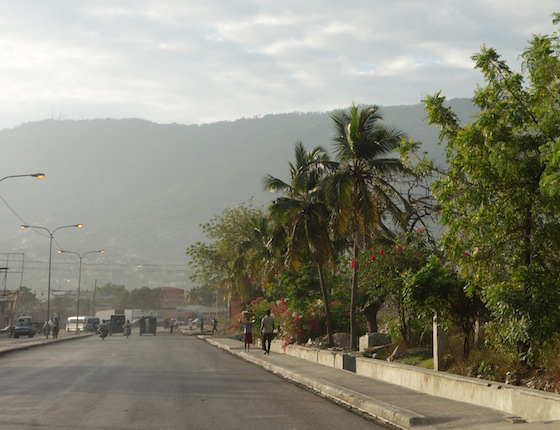Above: Port-au-Prince (CJ Photo)
By Alexander Britell
PORT-AU-PRINCE — At the end of last month, former Jamaican Prime Minister PJ Patterson told a meeting of the Rotary Club in Georgetown, Guyana that CARICOM was on life support.
The Caribbean must take action, he said, to prevent a “coma” for the integration movement.
Patterson is not alone.
While heads of state around the Caribbean often express their support for the regional body, most acknowledge that the pace of integration has been decidedly slow, and the energy for the movement is not where it needs to be.
“The sentiment has been expressed by [Patterson] and many other leaders in the Caribbean — that we have reached our limit [with CARICOM],” Trinidad and Tobago Foreign Minister Winston Dookeran told Caribbean Journal, though the country’s top diplomat appeared optimistic for its future. “We have indeed not been able to overcome that limit, and therefore it has created a sense of dismay among the people. I myself said that some time ago when we were trying to analyze what is the potential for CARICOM.”
But when the Caribbean’s leaders gathered in Port-au-Prince this week, the first time their bi-annual summit had ever been held in Haiti, there was a different sentiment.
Haiti, which is, by far, CARICOM’s most-populous Member State, seemed genuinely excited about hosting the event.
Flags from across the Caribbean, along with posters of regional leaders, peppered the streets of the capital, and the country’s government, led by current CARICOM Chairman and Haiti President Michel Martelly, made it clear it was proud to receive leaders at the summit at the Karibe Convention Centre in the suburb of Petion-Ville.
And the rest of the region, too, appeared eager to engage with Haiti, which has long been a spiritual symbol for Caribbean independence but has remained largely aloof from the wider region, only joining CARICOM officially in 2002.
“Haiti is part of the Caribbean community, and we are part of Haiti,” St Kitts and Nevis Prime Minister Dr Denzil Douglas said at a press conference to conclude the summit on Tuesday. “Haiti is an integral member of CARICOM.”
St Vincent and the Grenadines Prime Minister Dr Ralph Gonsalves, who was making his first-ever visit to Haiti, said Haiti was “no longer on the periphery of the Caribbean Community.”
“It is at its core, at its centre,” he said.
And Haiti came even closer Tuesday, with Caribbean leaders agreeing on the “progressive implementation” of French as a working language for CARICOM, beginning at the region’s next summit in July in Port of Spain, though other issues, such as the free movement of Haitians, were ultimately unresolved.
Martelly, with vigour, urged his neighbours to push forward on regional trade and integration, calling for a stronger regional transportation system — both by sea and by air — and, in particular, opening up the Caribbean’s maritime shipping lanes so that, for example, Haitian produce doesn’t have to go through more than one Caribbean country to get to its final destination.
All of the Haitian leader’s enthusiasm was a notable shift from typically somnolent CARICOM summits.
But can all of this energy, led by Haiti, jumpstart a lethargic CARICOM?
It’s too early to tell.
If Haiti can’t do it alone, the regional integration movement may find its saviour in the smaller Organization of Eastern Caribbean States.
Very quietly, the OECS has been been working on its own brand of regional integration — one some observers call more effective than CARICOM — with a single currency union, unobstructed free movement (using regional ID cards) and employment, and even a new (unelected) Parliament for the sub-regional bloc, which counts as its independent members the countries of Antigua and Barbuda, Dominica, Grenada, St Kitts and Nevis, St Lucia and St Vincent and the Grenadines.
At this week’s conference, CARICOM leaders adopted the OECS’ Revised Treaty of Basseterre into CARICOM’s Revised Treaty of Chaguaramas, which Gonsalves said would effectively give CARICOM member states the opportunity of integrating initially with the OECS and taking a seemingly quicker path to integration.
“The door’s left open,” Gonsalves said, although any potential country would have to do “everything” in order to integrate with the OECS, including joining the currency union. (He suggested that Barbados could be interested).
“We’re moving faster than everybody else,” Gonsalves said, though cautioning that the OECS would in no way supersede CARICOM, and that the move would be a different proposition for larger countries like Guyana.
Either way, it was clear that, after a two-day meeting in Petion-Ville, host country Haiti would no longer be an afterthought in the region’s political economy.
For Dookeran, the summit, and CARICOM’s presence here, “established clearly that Haiti is a part of the wider Caribbean.”
“The history has been one in which we have not been closely linked, and I think this meeting has done that,” he told CJ. “I think this meeting should open up the possibilities for economic development for Haiti, and, in doing so, create great opportunities for investment from the region — therefore, I think Haiti is the first step in the expansion of the Caribbean Community.”
